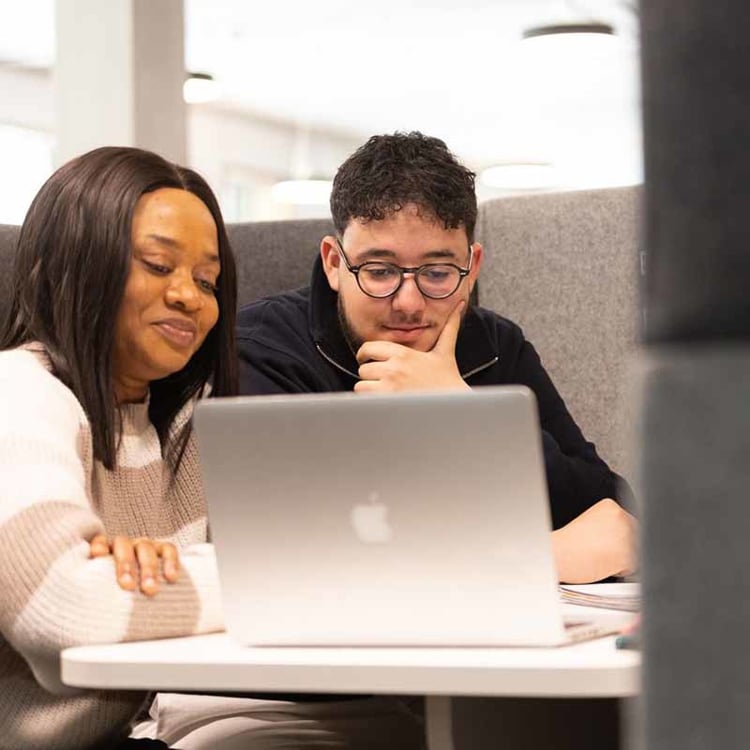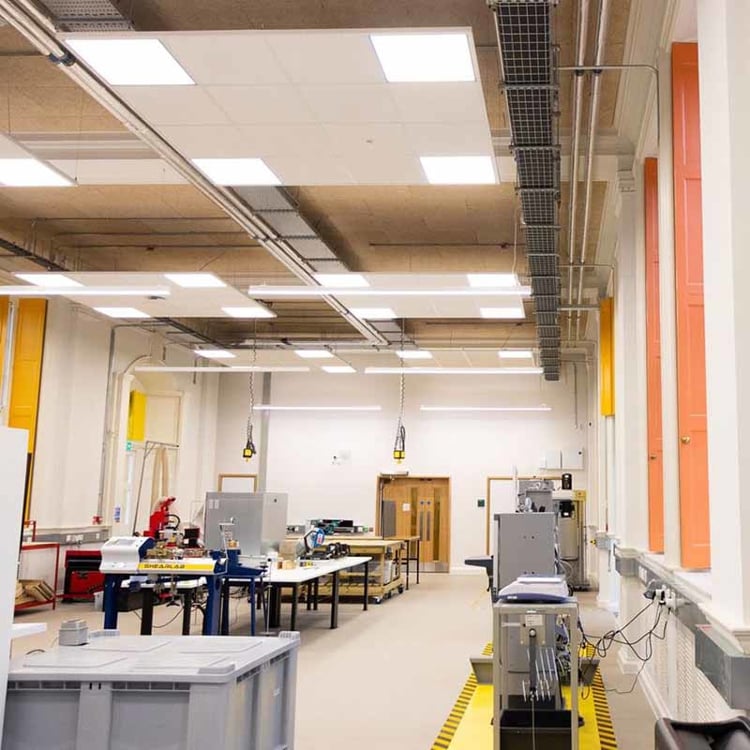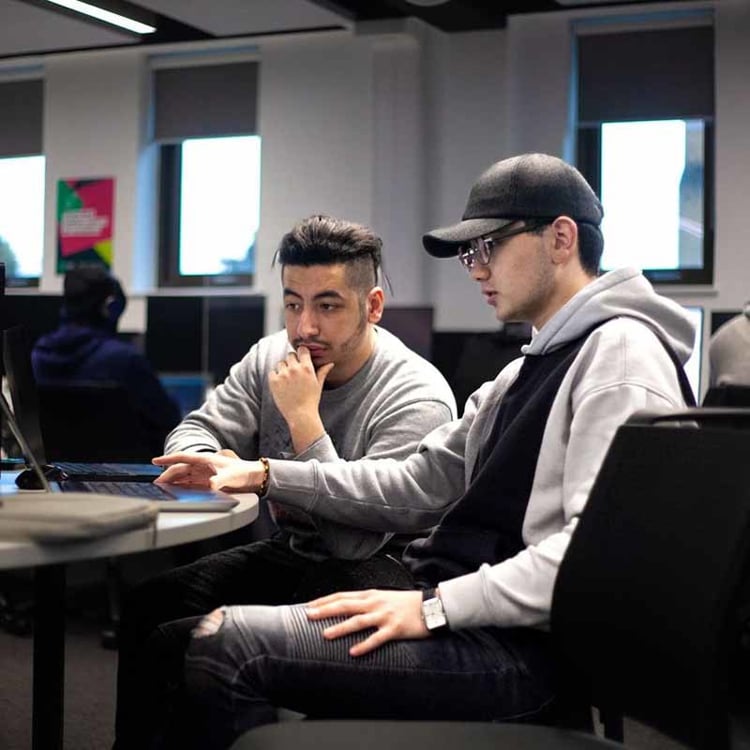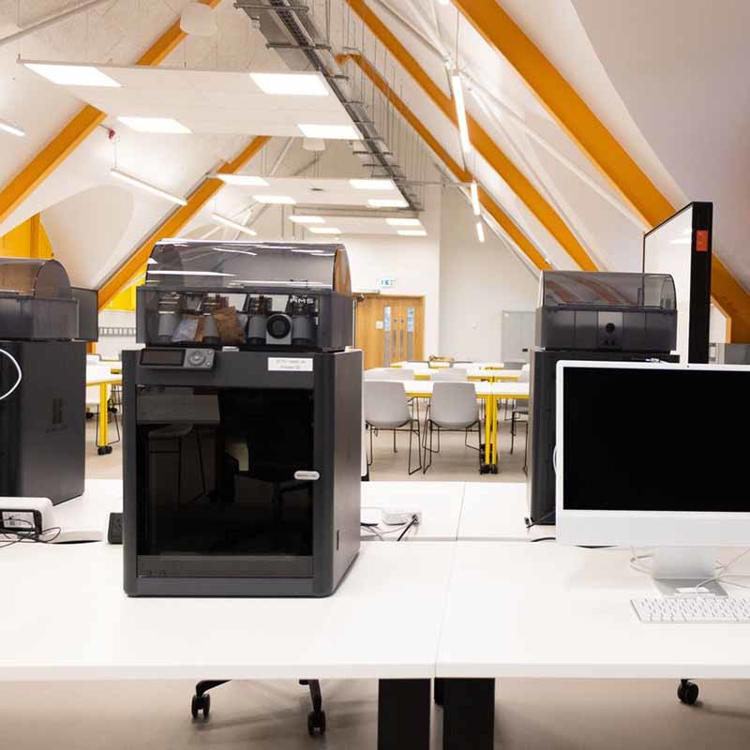Entry tariff:
112–128 UCAS points (or equivalent)
Foundation Year: 64–80 UCAS points (or equivalent)
International Foundation Pathway:
64 UCAS (or equivalent)
IELTS: 5.5
UCAS Code:
G400
G401 (If choosing Foundation Year)
Start date(s):
April 2026
September 2026
Dive into a cutting-edge Computer Science degree designed to prepare you for the fast-paced, ever-evolving world of technology.
Built to the high standards set by the British Computer Society, this course combines hands-on experience in areas like AI, cloud engineering, and software development with collaborative, project-based learning. With a strong emphasis on social ethics and professional skills, you'll graduate with a portfolio that showcases your expertise and sets you ahead.

At Roehampton, you’ll gain with the skills and experience to succeed in this fast-paced, ever-evolving field.
Our course is designed to give you comprehensive technical skills in software development, data science, and emerging technologies. Graduate ready to excel in a range of roles within the software development and broader technology industries. You’ll learn:
- Core Technical Proficiency - Gain specialised software development and computing skills including programming fundamentals, database design, web development, and system architecture. Access widely used industry tools (e.g., Python, Java, Git, cloud platforms, machine learning frameworks) that enable you to design and implement robust software solutions.
- Problem-Solving & Critical Thinking - Learn to solve complex computational problems, acquire systematic analytical thinking through mathematics and algorithms, critically evaluate software designs and critically assess technological solutions using logical reasoning and structured approaches.
- Full-Stack Development Skills - Develop comprehensive software engineering capabilities through hands-on experience in front-end and back-end development, database management, cloud computing, and modern development methodologies including Agile practices and version control.
-
- Data Science & AI Integration - Cultivate expertise in artificial intelligence, machine learning, and data engineering, emphasising ethical AI development, data visualisation, and the integration of intelligent systems into real-world applications with professional coding standards.
- Collaboration & Communication - Enhance teamwork skills through collaborative software projects and learn to articulate complex technical concepts clearly to both specialist and non-specialist audiences, supported by professional coaching and industry-standard practices.
- Adaptability & Independent Learning - Foster a mindset of continuous self-development and develop independent learning capabilities to stay current with rapidly evolving technologies, programming languages, and industry methodologies in the fast-changing digital landscape.
- Project Management - Acquire practical skills in planning, managing resources, and delivering successful technology projects using industry-standard methodologies, risk assessment, and professional practice frameworks.
You will graduate not just with knowledge, but with a demonstrable portfolio of projects and the confidence to explore a career in software development, data science, AI, and the broader technology sectors.
Modules
30 credits
This module introduces Computer Science as a professional and academic discipline. You will learn the fundamentals of computer systems and networks and gain practical skills that will be essential for your future in academia and industry.
You will develop and apply your knowledge and skills through a series of practical 'challenges'. Through guided activities, you will be able to recognise and understand the building blocks of the computer-based systems that are prevalent today. Practical skills are complemented by industry case studies through which you will identify and analyse the social, legal, ethical, and environmental impact of computing.
You will have the opportunity to develop your skills and knowledge through activities including:
- Using the command line interface.
- Installing an open-source operating system.
- Creating wired and wireless Local Area Networks (LANs).
- Troubleshooting connected devices, including camera and sound modules.
- Identifying and understanding the fundamental components of a computer (e.g., RAM, CPU, storage).
- Undertaking performance measurement and benchmarking.
- Developing your awareness of cyber security and the foundations of computer systems, including logic and assembly languages.
You will also investigate industry case studies, through which you will gain a breadth of understanding of the place of computer-based systems in industry and society and how professionals can influence issues such as environmental sustainability, equality and diversity, and the global economy.
Teaching and learning
The module is delivered via various activities that you will undertake in small groups in a carousel format. You will be able to prepare in advance for each activity, which will be supported by step-by-step instructions and background content in the form of videos and presentations.
Lecturers and lab demonstrators will help you in class.
Assessment
This module will be assessed by a knowledge-based in-class test (40%) and a journal/reflection, either written or audio/visual presentation (60%).
30 credits
Software development and programming form the foundation of all Computer Science studies, from web development to artificial intelligence. This module introduces you to the main concepts of computational thinking and their translation into the fundamentals of programming.
You will learn to create pseudocode and Python programs while exploring how programming languages provide essential resources such as documentation, libraries, integrated development environments (IDEs), and debugging tools.
The emphasis will be on core programming principles rather than language-specific details; however, Python will be the primary language for class examples, laboratory exercises, and coursework submissions. Python has been chosen for its popularity with employers, widespread use, and its syntax being particularly suitable for novice learners. The module is designed to future-proof your skills and provide a solid foundation in programming for the remainder of your studies.
In addition to technical skills, the module supports you in developing key academic and professional competencies for computing, including finding, evaluating, and using technical information, becoming resourceful, and building resilience as an independent problem-solver. You will also be introduced to the use and integration of artificial intelligence and AI-based tools in programming.
Teaching and learning
Lecturer-led sessions that deliver the key knowledge-based learning outcomes through explanations, live coding demonstrations, worked examples, and individual practice activities.
Hands-on laboratory practice in which you will apply the knowledge areas and develop practical programming skills through guided exercises and problem-solving tasks.
You'll also have 30 minutes of online learning to help you prepare for classes and revision. Material includes video tutorials, code walkthroughs, and interactive presentations.
Assessment
This module will be assessed by a computational problem-solving portfolio (60%) and a live programming challenge with code review (40%).
30 credits
This module introduces you to foundational tools and processes required to develop software applications aimed at specific users. You will cover the basics of designing user interfaces, creating web pages, understanding databases, and linking 'frontend' and 'backend' code.
You will have the opportunity to apply your knowledge from software development to real-world problems and consider the needs of users and stakeholders.
There is a strong focus on databases, including database modelling and design. You will also further develop your programming skills and knowledge of industry best practices, including containerisation, version control, debugging, testing, and coding standards.
By the end of this module, you will have built your own fully functional, user-tested web application from scratch, integrating a database and secure backend logic.
Teaching and learning
The module is delivered via a series of practical lab sessions based on weekly tasks and supported by screencasts and online coding resources that develop your skills and knowledge.
The module employs a project-based approach to build the foundational knowledge and practical skills students need. This structure ensures you not only understand the general importance of the material but also gain hands-on experience applying core concepts.
Assessment
This module will be assessed by coursework (40%) and web application (60%).
30 credits
This module introduces you to the mathematical and algorithmic foundations that power Computer Science. You will explore how mathematical reasoning shapes the way computers solve problems, learning to express real-world challenges in precise, logical, and computable forms.
Through an engaging mix of lectures, seminars, and practical labs, you will build confidence in key areas such as logic, set theory, proof techniques, and discrete mathematical structures. These ideas form the backbone of algorithm design, from creating efficient data structures to developing algorithms for optimization, automation, and data processing.
The module nurtures your computational thinking, analytical precision, and creative problem-solving skills, showing how mathematical concepts translate directly into the ability to design intelligent solutions for complex digital problems.
By the end of this module, you will be able to:
- Understand the core mathematical concepts that underpin Computer Science.
- Recognise how discrete structures represent and organise data.
- Design, analyse, and evaluate algorithms for real-world applications.
- Apply logical and mathematical reasoning to develop reliable computational solutions.
- Appreciate the importance of expressing problems mathematically so that they can be solved algorithmically.
- Develop the confidence to approach computing challenges with creativity, structure, and precision.
Ultimately, this module bridges mathematical theory and algorithmic practice, helping you see how abstract ideas can drive innovation and problem-solving in today's digital world. You will develop an appreciation for and practical skills in the core logic and reasoning that underpins everything from encryption to artificial intelligence.
Teaching and learning
The module employs a problem-centric pedagogical approach, introducing mathematical concepts and methods through practical programming exercises and applied problem-solving.
This approach explicitly connects learning activities to assessment criteria, enabling you to recognise and apply your developing mathematical knowledge in computing contexts.
Assessment
This module will be assessed by an in-class test (50%) and a algorithm design project (50%).
These are the current planned modules on this course and may be subject to change.
30 credits
This module builds upon foundational computing knowledge to develop technical competencies in networks and operating systems. You will gain understanding of the infrastructure that underpins modern digital environments, cloud services, and enterprise IT operations. The module emphasises both theoretical principles and practical implementation skills essential for professional IT practice.
Building on introductory computing concepts from Level 4, this module is delivered through integrated theoretical instruction and extensive hands-on laboratory work.
You will develop professional-level skills in network design, configuration, and management, alongside comprehensive understanding of operating system architecture, administration, and security hardening.
The module prepares you to address complex real-world challenges in enterprise IT environments and positions you for advanced study in specialised areas such as cloud computing, cybersecurity, and systems engineering.
Teaching and learning
This module adopts a project-centred, active learning approach designed to foster technical problem-solving, critical evaluation of infrastructure solutions, and professional application of networking and systems administration principles. The teaching strategy integrates theoretical seminars with practical workshops, supported by structured independent study and comprehensive formative feedback opportunities.
Seminars introduce networking and operating systems concepts, principles, and industry best practices, whilst workshops provide hands-on experience with network configuration, system administration tasks, security implementation, and troubleshooting exercises.
Assessment
This module will be assessed by laboratory-based coursework (60%) and a team-based network and systems integration project (40%).
30 credits
This module introduces you to Artificial Intelligence (AI), exploring how computers make rational decisions, and Data Analytics, which involves interpreting diverse datasets to draw meaningful conclusions.
The module integrates fundamental AI concepts with practical data analytics techniques, preparing you for advanced study in machine learning and real-world applications in data science.
You will explore the fundamental question of how rational behaviour is defined and how challenging AI problems are defined. This includes understanding agent-based systems (computer programs that respond and change behaviour according to their environment) and stochastic problems (situations where randomness or uncertainty plays a role).
The module examines AI problem spaces (the entire set of possible states or moves a system can make) and methods for efficiently searching these spaces.
You will investigate complex scenarios like two-player games, constraint satisfaction problems (finding a solution while respecting specific limits or conditions), and probabilistic reasoning, including Bayes' theorem, that allow systems to make decisions under uncertainty. Ethical implications of AI decision-making, including fairness, transparency, and accountability, will also be considered throughout the module.
Alongside AI concepts, you will develop practical skills in data analytics. The module will ensure you have good skills in data wrangling (cleaning and transforming raw data), data visualisation, descriptive statistics, and exploratory data analysis (EDA).
You will also gain experience in identifying, sourcing, and collecting appropriate datasets, with consideration for data quality, ethics, and legal responsibilities such as data privacy and bias. You will work with various data sources, applying appropriate analytical tools and statistical tests to solve problems. The module further introduces how AI techniques, such as pattern recognition and basic machine learning approaches, can be applied within data analytics to extract insights from complex datasets.
Teaching and learning
Teaching combines seminars and practical laboratory sessions with problem-based learning activities, encouraging you to apply AI and data analytics methods to authentic challenges.
Seminars will introduce key concepts, algorithms, and theoretical foundations through discussion, worked examples, and group activities. Laboratories will focus on hands-on implementation of AI techniques and data analytics methods using appropriate programming languages and tools, including Python, relevant AI libraries, and data analytics frameworks.
Independent study, guided tasks, and continuous formative feedback support your confidence development. All resources and recordings will be accessible online.
Assessment
This module will be assessed by an AI problem solving and search video recording (50%) and a data analytics project (50%).
30 credits
This professional practice-focused module gives you the opportunity to use and enhance your programming skills while experiencing how complex software projects are developed and managed in industry.
In this module, you will work in a group throughout the term to create a full-stack web application using industry-standard Agile development methodology and modern project management techniques.
You will use industry-standard tools to create designs, establish shared development environments, design a database, develop, share, test code, and finally deploy and run your applications. In this experience of the entire software development lifecycle, you will need to combine and develop your full range of technical, professional, and teamwork skills.
Each week's class is divided into individual and group work sessions.
In your individual work, you will be introduced to a new skill or technique to develop. These will include introductions to commonly used frontend and backend development frameworks, as well as ‘devOps’ and testing technologies, for example Docker and GitHub Actions, Jest unit testing and Nightwatch browser automation.
In the group session, you will review your weekly tasks and goals and hold a supportive 'standup' meeting with your lecturer to ensure the project progresses efficiently and with equal participation. You may be allocated a specialist role in your group (for example, Project Manager, Frontend Developer, DevOps Engineer, Quality Assurance specialist), but you will also build skills and experience across all these areas.
You will be expected to communicate with your group between the weekly sessions to ensure that planned work is undertaken within the required timeframe.
Groups are encouraged to create a project that serves social and environmental purposes. This requires you to explore user needs, ethical and professional issues, and security. You will establish Personal Learning Journey (PLJ) goals at the beginning of the module and maintain a PLJ journal throughout. This will prepare you for your third year and enable you to start focusing on specialist areas for your Final Year project. A professional Agile coach will conduct a masterclass of best practices in project planning and teamwork.
This module will give you ample opportunity to become familiar with industry practice and build your professional portfolio. You will be encouraged to reflect on your experiences and understand how these can support your job applications and interviews.
Teaching and learning
You will gather technical skills in lab sessions, that build on your earlier modules and immediately apply these to the group project via carefully planned weekly tasks.
The technical skills are supported by screencasts and lab sheets so that there are easy to use resources available for you to implement the technical features required for their projects.
Assessment
This module will be assessed by a group software development project (70%) and an individual reflective practice and mock interview (30%).
30 credits
This module significantly advances your software development skills, focusing on the design and implementation of complex software systems.
You will take a model-driven approach throughout, integrating Object-Oriented Programming (OOP), Unified Modelling Language (UML), and software design patterns to effectively bridge conceptual modelling and practical development.
You'll deepen your understanding of OOP principles, including abstraction, encapsulation, inheritance, and polymorphism, through hands-on Java programming. You will learn to capture requirements and design robust systems using UML diagrams such as Use Case, Class, Sequence, State Machine, Activity, Component, and Deployment diagrams. The module also introduces model-based testing, enabling you to validate UML models against their Java implementations.
You will gain proficiency in applying design patterns (creational, structural, and behavioural), understand their architectural implications, and employ them within the Model-View-Controller (MVC) framework. You'll use modern component-based frameworks to understand code reuse and integrate event-driven programming techniques to develop graphical user interfaces (GUI) using best design practices.
Throughout the module, emphasis is placed on best coding practices, testing and quality assurance using JUnit, and integrating emerging technologies such as AI into modern software development workflows.
You will gain comprehensive knowledge of robust system design, architecture, and industry-standard practices. This, combined with the analytical precision and advanced problem-solving methods taught, prepares you for advanced technology roles or further academic study.
Teaching and learning
Lectures will introduce modelling concepts, UML notations, design patterns, and architectural principles, whilst workshops will consist of hands-on modelling exercises, code implementation tasks, design pattern applications, and case study analyses.
This module adopts a model-driven, active learning approach designed to foster problem-solving, critical thinking, and the application of software engineering principles to practical scenarios. The teaching strategy combines theoretical lectures with extensive practical workshops, supported by guided independent study and formative feedback opportunities.
Assessment
This module will be assessed by a UML modelling and design patterns portfolio (40%) and system implementation and testing (60%).
These are the current planned modules on this course and may be subject to change.
This course offers all students the option of a one-year paid work placement, to boost your employability even further. If you choose this route, you will take the placement following year two of your course, and then return to complete your degree.
Why take a placement?
A placement year is the perfect opportunity to gain valuable work experience, to build on the career skills we will teach you on this degree. The connections you make on the placement will improve your career prospects further, and equip you with the skills you need to secure graduate-level employment.
How we support you
The University's Placement and Work Experience Team are experts at helping you to secure a placement. They will work closely with you from the start, helping you research potential employers, discover placement opportunities, create and pitch your CV, and will coach you to perform well in interviews. We aren't able to guarantee a placement, but our sector-leading advisors will give you the best possible chance of securing one.
Find out more about how we'll support you
We understand that your plans might change once you start your programme. If you decide not to do a placement, you will have the option of completing the three year version of your programme.
Whatever your choice, you will have access to many opportunities for work experience through our Placement and Work Experience Team, and access to face-to-face and 24/7 online careers support.
30 credits
This module develops your ability to design, implement, and manage modern data systems within cloud environments. It builds on your prior knowledge of software engineering and using data to introduce the key principles, tools, and practices that underpin scalable, secure, and sustainable data engineering in the cloud.
You will learn how to model, ingest, and process data using distributed and virtualised resources; orchestrate and automate data workflows; and integrate analytics or machine learning components to generate actionable insights.
Core topics include:
- Introduction to Cloud and Data Engineering
- Cloud infrastructure and services for data engineering
- Data modelling, ingestion, and integration techniques
- Data transformation and processing in the cloud
- Data storage solutions in cloud and on-premises environments
- Pipeline orchestration and automation
- Cloud data security, privacy, and governance
- Integrating machine learning into cloud workflows
- Cloud monitoring and performance optimization
- Designing and presenting end-to-end cloud data solutions
Teaching and learning
Teaching combines seminars and practical lab sessions, and project-based group work, encouraging you to solve real-world problems and collaborate effectively.
Seminars will introduce key concepts, frameworks, and case studies, while labs will focus on hands-on development and collaborative problem-solving teams.
Independent study, guided tasks, and formative feedback points ensure that you are supported in applying theory to authentic technical challenges.
Assessment
This module will be assessed by a design and implementation of a cloud data pipeline, group project (40%) and an integrated cloud data solution, group project (60%).
30 credits
This module is designed to develop the professional skills and mindset needed to succeed in technology-related careers, alongside enhancing your research and academic skills.
Taking key emerging technologies and current professional issues within your chosen pathway as a starting point, you will define and develop your own area for enquiry. You will be supported to systematically find and analyse academic and industry research publications and review existing technical solutions relevant to your area.
You will return to key topics in professional practice, including project lifecycle management, professional frameworks, agile and traditional methodologies, technical communication, ethical and legal considerations with deeper understanding, and apply these to your own project. You’ll also engage with global perspectives and inclusive practices relevant to your discipline.
Teaching and learning
Your learning will be active and applied. In class, you’ll participate in seminars, lab-based workshops, and project supervision sessions. Outside the classroom, you’ll conduct independent research, collaborate with peers, and use industry-standard tools such as Git, Trello, and JIRA to manage your work.
Each week includes a four-hour teaching session, structured as:
- Interactive keynote discussion - introducing key concepts, frameworks, and professional contexts.
- Guided workshop activities - hands-on practice with tools, methods, and scenarios; individual and collaborative problem-solving.
You will begin to engage with outside stakeholders relevant to your project and apply your knowledge and skills in user research and requirements gathering.
Assessment
This module will be assessed through coursework, where you will prepare a literature review on a chosen topic (50%) and poster project proposal with a Q&A session (50%).
30 credits
This module introduces you to the fundamental principles, algorithms, and practices of Machine Learning (ML), the field where systems learn from data to make predictions, whilst integrating the art and science of Data Visualisation to interpret and communicate insights effectively.
Through a balanced blend of theory and practice, you will explore the end-to-end ML workflow: from data pre-processing (cleaning and organising data) and model development to evaluation, interpretation, and visual storytelling.
You will gain practical experience with a wide range of ML techniques including regression (predicting continuous values) and classification models (predicting categories), neural networks (systems modelled after the human brain), clustering, unsupervised learning (finding patterns in unlabelled data), reinforcement learning (systems learning through trial and error), and deep learning (advanced neural networks).
Additionally, you will develop expertise in high-dimensional data visualisation and Explainable AI (XAI), enabling you to make complex models interpretable and their outputs accessible to diverse audiences.
Teaching and learning
Teaching combines seminars and practical laboratory sessions with project-based group work, encouraging you to solve real-world problems and collaborate effectively.
Seminars will introduce key concepts, algorithms, and example datasets, whilst laboratories will focus on hands-on model development and collaborative problem-solving in teams. This approach ensures you gain both theoretical understanding and practical implementation skills essential for professional machine learning practice.
Independent study, guided tasks, and formative feedback points ensure that you are supported in applying theory to authentic technical challenges. All resources and recordings will be accessible online, and regular guidance and peer collaboration will help you build confidence and achieve your full potential.
Assessment
This module will be assessed by a machine learning model design and visual evaluation group project (40%) and an integrated machine learning and visual analytics group project (60%).
30 credits
The Capstone Project provides you with the essential opportunity to deeply explore a subject of high personal interest, situated within the context of your overall programme of study.
You are expected to apply and synthesise your professional practice and research capabilities throughout this project. By bringing these skills together, you will conduct a substantial investigation that extends and demonstrates your practical and academic knowledge. Upon completion, you will produce a significant technical artifact alongside a detailed report.
Building on the Professional Practice in Technology module, you will be able to critically engage with current literature and established research methodologies. Using the knowledge and feedback gained from this module, you will be equipped to develop your research question or problem statement. This work will lead you to systematically evaluate relevant sources, creating a strong foundation for your investigation.
Implementing knowledge gained from the earlier module will enable you to strengthen your methodological approach and demonstrate advanced research and problem-solving skills in your capstone project. You will be able to design and implement an evidence-based solution that addresses your research question and stated objectives. The project culminates in a critical evaluation and reflection on the impact of your solution in relation to your original research goals.
You will be assigned a named individual supervisor who will provide expert guidance throughout your project. While your supervisor is key, you are strongly encouraged to access the full range of academic and research support systems available across the university to enhance your work.
Collaboration is often a feature of the Capstone Project: you may either work with external stakeholders who provide a real-world project brief, or you may have the chance to work alongside an academic, contributing directly to their ongoing research. This project is not undertaken in isolation; peer support is fundamental, and your Capstone Project is developed within a strong, supportive learning community of both staff and fellow students.
Teaching and learning
The module is delivered via three modes of study:
- On-campus sessions that help you conform to the necessary timeline and project requirements
- One-to-one feedback from a named supervisor
- Independent study
The on-campus sessions provide practical activities which directly contribute to the students’ project deliverables.
Peer support via on-campus session activities and group supervisory meetings is strongly encouraged and rewarded via digital badges in Moodle.
Assessment
This module will be assessed by a feedback-feedforward and Q&A session (30%) and a report and artefact (70%).
These are the current planned modules on this course and may be subject to change.
This course offers a foundation year, which takes place at the beginning of your studies. Studying a foundation year will give you academic and practical experience, and a strong introduction to your subject, ensuring you succeed on your undergraduate degree.
30 credits
You will develop your core academic and integrated English language skills of speaking, listening, reading and writing. You will become familiar with key academic skills and concepts, such as referencing methods and awareness of academic integrity and tone. You will apply these skills and knowledge to both broad topics and also your chosen subject pathway.
Teaching and learning
You will be required to actively engage in on-campus learning for up to 10 hours a week.
You will be taught through a full range of teaching and learning methods, which include lectures, seminars, workshops, discussion groups, group directed tasks and presentations. This will enable you to learn from your peers and tutors in both structured and information settings.
You will be encouraged to think creatively about your approach to learning and discussions with your peers. You will also have access to recordings, resources, links and signposting through Moodle to enrich your learning.
Assessment
You will be assessed through group and individual presentations, comparative and reflective essays, multiple choice exams, coursework and reports, oral exams, portfolios, case studies and blogs.
30 credits
You will develop your core academic and integrated English language skills of speaking, listening, reading and writing. You will become familiar with key academic skills and concepts, such as referencing methods and awareness of academic integrity and tone. You will apply these skills and knowledge to both broad topics and also your chosen subject pathway.
Teaching and Learning
You will be required to actively engage in on-campus learning for up to 10 hours a week.
You will be taught through a full range of teaching and learning methods, which include lectures, seminars, workshops, discussion groups, group directed tasks and presentations. This will enable you to learn from your peers and tutors in both structured and information settings.
You will be encouraged to think creatively about your approach to learning and discussions with your peers. You will also have access to recordings, resources, links and signposting through Moodle to enrich your learning.
Assessment
You will be assessed through group and individual presentations, comparative and reflective essays, multiple choice exams, coursework and reports, oral exams, portfolios, case studies and blogs.
30 credits
You will develop your research, numeracy and information technology skills. You will investigate the difference between primary and secondary research, conduct your own research project and demonstrate your findings through data analysis. You will also develop your awareness of equality, diversion and inclusion in the UK, through a real-world issue; discrimination in the workplace.
Teaching and learning
You will be required to actively engage in on-campus learning for up to 10 hours a week.
You will be taught through a full range of teaching and learning methods, which include lectures, seminars, workshops, discussion groups, group directed tasks and presentations. This will enable you to learn from your peers and tutors in both structured and information settings.
You will be encouraged to think creatively about your approach to learning and discussions with your peers. You will also have access to recordings, resources, links and signposting through Moodle to enrich your learning.
Assessment
You will be assessed through group and individual presentations, comparative and reflective essays, multiple choice exams, coursework and reports, oral exams, portfolios, case studies and blogs.
30 credits
You will be taught about how the use of computing software impacts the environment from day-to-day activity through use of business and everyday jobs. This is through the excessive use of computing software as well as the changing way that society operates. You will be encouraged to engage in debates and discussions regarding energy consumption in the use of computing software, in terms of the amount of use as well as the type of materials utilised. You will be encouraged to look at responsible innovation and software impact and the long-term effects this may have.
You will look at how the increased use of IT and computing has contributed to the significant development of globalisation in the interconnectivity and internationalisation of the job market. Discussions on how globalisation has contributed to the international development of education, technology development and the emerging market economies through operating systems and internet operations. This is also linked to their assignment in the international platform of Linked In in developing their e-portfolio.
Teaching and learning
The teaching delivery for each module consists of one, one-three-hour lecture and one, two-hour lab session each week with pair and group work.
There will also be a 30-minute weekly virtual task and multiple-choice quizzes.
Assessment
This module will be assessed using a multiple-choice test and online portfolio.
40% - multiple choice test, which will take place online during a class.
60% - online portfolio, in this written task you will create a blog post, which reports on an individual data research and processing project. You will also create a LinkedIn profile and subject weekly learning journal entries.
30 credits
This module focuses on how to solve problems via program development. The module initially builds your understanding of logic, before teaching you how to develop algorithms. The latter half of the module focuses on programming using a Visual Programming Language (VPL) such as Android App Inventor or Google’s Blockly. The module ends with a discussion on the limits of computation, including data representation and physical limitations.
You will be taught about how the use of computing software impacts the environment from day-to-day activity through use of business and everyday jobs. This is through the excessive use of computing software as well as the changing way that society operates. You will be encouraged to engage in debates and discussions regarding energy consumption in the use of computing software, in terms of amount of use as well as type of materials utilised. You will look at responsible innovation and software impact and the long-term effects this may have.
The module explores how advancements in computing and IT have accelerated globalisation by enhancing interconnectivity, transforming industries, and expanding access to information. You will examine the role of computational thinking and problem-solving in a global context, including the impact of software development, and automation on international markets. Discussions will focus on how programming and algorithm design contribute to technological advancements, remote collaboration, and the evolving global job market. Additionally, you will be able to engage with international computing standards and digital platforms, such as LinkedIn, to develop your profile and understand the significance of global networking in the technology sector.
Teaching and learning
The teaching delivery for each module consists of one, one-three-hour lecture and one, two-hour lab session each week with pair and group work.
There will also be a 30-minute weekly virtual task and multiple-choice quizzes.
Assessment
This module will be assessed using programming coursework and a class test.
60% - coursework, you will design a simple algorithm to solve a problem using flowcharts and pseudocode.
40% - class test, you will construct a program to solve using a Visual Programming Language.
These are the current planned modules on this course and may be subject to change.
Careers
You’ll graduate ready for a career in software development and the broader technology industry.
This programme is designed to address critical skills shortages and the future of the tech industry, empowering you to progress in your future.
You'll gain industry-aligned skills for roles such as:
- Software engineer
- Data scientist
- Information security developer
- DevOps engineer
- Machine learning engineer
- Data engineer
- System analyst

Top 3 modern university in London
(Complete University Guide 2025)

The Student Futures team is here to support you throughout your time at Roehampton and beyond.
They offer services tailored to your needs, helping you take confident steps towards your future.
You’ll have access to a wide range of career workshops and events, where you can engage with employers and develop the skills you need to succeed in the workplace.
These opportunities will help you build your CV, prepare for interviews, and connect with successful Roehampton graduates who are thriving in their careers. You’ll also be able to engage with our partners across London and beyond.
Wherever you want to go in the future, you'll be preparing for the world of work from your very first day.

"The facilities at Roehampton are outstanding. The library is my favourite go-to study spot. It’s calming and inspiring, with plenty of spaces for students to focus. On days when I need to write code, I head to the labs in David Bell, which are well-equipped for hands-on learning."
Morteza, Computer Science Student
Learning and Assessment
We believe in learning by doing.
You'll work individually and with others to tackle real-world technology challenges and take part in interactive activities that bring learning to life. Your assessments are designed to reflect tasks you’ll encounter in the software industry, helping you develop the skills you need to succeed after graduation.
Your lecturers will be subject specialists and industry-experienced professionals who bring cutting-edge research and real-world insights directly into your learning experience. This approach ensures you're not just learning theory, but building the practical skills and critical thinking needed for a successful career.
#8 in England for undergraduate student satisfaction
National Student Survey 2024

How You’ll Learn
You’ll engage in a variety of learning styles designed to prepare you for the real world of technology:
-
Workshop-centred learning: You’ll take part in practical, hands-on workshops rather than traditional lectures, encouraging active participation and skill development.
- Project-based learning: You’ll apply your skills to real-world scenarios, working on projects that reflect the challenges faced in the tech industry. These experiences build confidence and prepare you for professional roles.
-
Collaborative learning: You’ll work in teams to solve real-world technology challenges, developing teamwork, communication, and project management skills.
-
Competency-based learning: This approach allows you to master key technical skills at your own pace, focusing on what you can do—not just what you know. You’ll progress by demonstrating real abilities through practical tasks, projects, and assessments aligned with industry expectations.
-
Industry-standard tools and facilities: You’ll work with a range of professional tools and environments, including programming languages like Python, Java, and C++, as well as IDEs such as Visual Studio Code, Jupyter Notebook, IntelliJ IDEA, and CodeGrade. For machine learning and AI, you'll use platforms like TensorFlow, Keras, and PyTorch, and for data engineering, tools such as Apache Spark, Hadoop, and SQL/NoSQL databases. You’ll also gain experience deploying and testing your applications using cloud platforms like Microsoft Azure.
In addition, you’ll have access to high-performance computing labs, virtual labs, and collaborative workspaces, giving you the flexibility to work on individual or group projects in real-world settings—on campus or remotely.
- Personalised supported lab activities: You’ll benefit from technical lab sessions tailored to your learning needs, with teaching teams on hand to support you as you explore tools and techniques at your own pace.
-
Flexible learning: You’ll have access to videos, online resources, and interactive quizzes ahead of time, allowing you to engage with content at your own pace and come to workshops ready to apply what you’ve learned.
This blended approach ensures you build strong, industry-ready technical skills while collaborating closely with your lecturers and peers in a dynamic, supportive learning environment.
How You’ll Be Assessed
You’ll complete authentic assessments designed to mirror the real-world tasks computer science professionals face. Your projects, exercises, and assignments will give you hands-on experience, preparing you fully for your career after graduation.
Your assessments will include:
- Practical assignments: Hands-on assessments where you will solve problems under real-world conditions - testing your ability to think critically and act decisively.
- Lab activity-based coursework: Coursework based on lab activities where you are required to apply tools and techniques learned in class, followed by analysis and reflection to show your understanding of principles in action.
- Analysis and writing reports: You will investigate issues and communicate your findings through structured reports, developing your ability to analyse data, evaluate risks, and present professional-level documentation.
- Real-world based coursework: These assessments are grounded in real-world scenarios, asking you to solve practical problems that aim to mirror the challenges faced by professionals in the field.
- Gamified assessments: Interactive assessments will test your problem solving and technical skills in a fun, engaging environment using game style challenges to make learning exciting.
- Project-based assessments: Through these assessments, including a capstone final year project you will apply your knowledge to real-world problems, designing and delivering solutions that showcase your technical skills, creativity and readiness for professional practice.
- Group work assessment: In group-based assessments, you will collaborate to simulate real work environments while individually demonstrating key competencies, ensuring you build both teamwork and technical skills aligned with industry expectations.

Cutting-edge facilities in the Sir David Bell building
We offer six dedicated computing labs on campus, each equipped with specialised facilities, including a dedicated cyber security lab.
All the software necessary for your studies is freely available, allowing you to work conveniently from anywhere and at any time using your personal device.
Open days
Get a real taste of our campus, community and what it’s like to study at Roehampton
Applying
Full-time UK undergraduate students apply through UCAS.
Entry tariff
112–128 UCAS points (or equivalent)
Foundation Year: 64–80 UCAS points (or equivalent)
Looking to work out your UCAS points or find out about our entry requirements? Find out more.
When we consider applications to study with us, we form a complete view of your achievements to date, and future potential, and can offer flexibility in entry requirements. Find out more about our Contextual Offer scheme.
We welcome applicants with a wide range of qualifications, including BTECs, A-levels and T Levels.
General entry requirements
International undergraduate students apply through our direct application system.
Entry tariff
112–128 UCAS points (or equivalent)
International Foundation Pathway:
64 UCAS (or equivalent)
IELTS: 5.5
Looking to work out your UCAS points or find out about our entry requirements? Find out more.
When we consider applications to study with us, we form a complete view of your achievements to date, and future potential, and can offer flexibility in entry requirements. Find out more about our Contextual Offer scheme.
Specific entry requirements
Entry to this course normally requires a Mathematics, Computer Science, or another science/technology based subject at A Level (or equivalent).
General entry requirements
Fees and funding
UK students
Tuition fees
| Entry date | Undergraduate Year 1 | Undergraduate Foundation Year |
|---|---|---|
| April 2026 | £9,535 | – |
| September 2026 | £9,790 | £9,790 |
Prices shown are for the first year of your degree.
Funding your studies
We also provide other ways to support the cost of living, including on-campus car parking, hardship support and some of the most affordable student accommodation and catering in London.
International students
Tuition fees
| Entry date | Undergraduate Year 1 | Undergraduate Foundation Year | International Foundation Pathway |
|---|---|---|---|
| April 2026 | £16,950 | – | – |
| September 2026 | £17,628 | £17,628 | £17,628 |
| January 2027 | – | – | £17,628 |
Prices shown are for the first year of your degree.
Funding your studies
We also provide other ways to support the cost of living, including on-campus car parking, hardship support and some of the most affordable student accommodation and catering in London.






